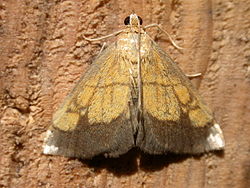| Evergestis limbata | |
|---|---|
 | |
| Scientific classification | |
| Kingdom: | Animalia |
| Phylum: | Arthropoda |
| Class: | Insecta |
| Order: | Lepidoptera |
| Family: | Crambidae |
| Genus: | Evergestis |
| Species: | E. limbata |
| Binomial name | |
| Evergestis limbata Linnaeus, 1767 | |
| Synonyms | |
| |
Evergestis limbata is a species of moth of the family Crambidae first described by Carl Linnaeus in 1767. [1] It is found in Europe.

The wingspan is 20–23 mm. The moth flies from June to August depending on the location.
The larvae feed on Brassicaceae species, such as garlic mustard ( Alliaria petiolata ) and hedge mustard ( Sisymbrium officinale ).